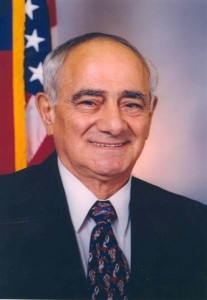
HARRISBURG – State Rep. Camille “Bud” George, D-74 of Clearfield County, denounced a recent policy change at the state Department of Environmental Protection.
“What we’re seeing here is yet another step by the administration toward less accountability, less transparency, and a total lack of responsibility for ensuring that Marcellus shale gas drilling is properly regulated and public safety remains the priority,” said Rep. George, Democratic chairman of the House Environmental Resources and Energy Committee.
A recent e-mail that was leaked out of the department shows an executive announcing that any notice of violation by a gas driller must be approved by top management officials, up to and including the Secretary of Environmental Protection.
“Essentially, when an inspector discovers a violation at a well site, the violation must go through several layers of bureaucracy, up to and including a politically appointed official, before that violation notice can be issued to the company,” George said. “Pennsylvania should not risk its precious water resources to potential political influence and bureaucratic hurdles.”
More than 1,400 violations were issued against drillers in the Marcellus from January 2008 to June 2010. Under this new directive, the DEP Secretary will have to personally sign off on every violation that occurs from now on.
“I worry about violations being dismissed under the guise of ‘open for business’ policies,” George said. “Just the fact that this policy was initiated probably will have a chilling effect on reports from the field.”
“In the early 1980s, a DER inspector was fired, and it was alleged that his reports and inspections were not easy enough on an industry he was hired to regulate,” George said. “The allegations were never satisfactorily resolved, in my opinion, and the agency suffered from the image of undue influence by powerful people.”
George said the policy directive is the antithesis of transparency.
“This micro-managing of information, especially violations, will cause everyone to doubt anything the DEP reports,” George said. The DEP cannot become Langley CIA headquarters on the Susquehanna, controlling information as if it were top-secret. It is information the Commonwealth needs to protect its citizens and resources.”
George said he believes the policy change will boomerang on the gas industry.
“This is going to backfire on the gas industry,” he said. “I think we can have a vibrant Marcellus shale gas industry in Pennsylvania with one big caveat – it has to be done correctly with regulations and safeguards that are continually updated. We come across new challenges almost weekly.”
George offered his assistance to any field inspector who feels that a violation report was unjustly dismissed.
“I have fought for years for stronger whistleblower laws to protect people in scenarios just like this,” George said. “If someone feels that a violation report was unjustly dismissed, I will do everything in my power to ensure accountability and I will protect the inspector’s identity. Anyone may contact my office.”